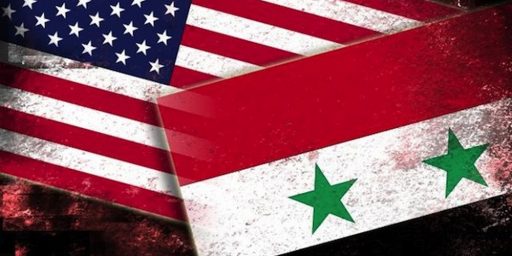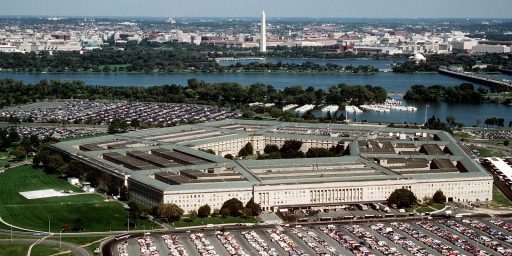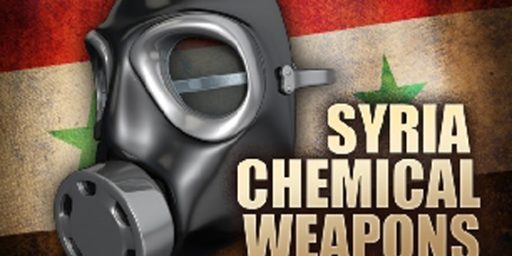Saddam Hussein’s Failed Gamble
Only Hussein Had Full Picture (Bob Drogin and Mark Mazzetti, LAT, p.1)
Shortly before the U.S. bombing and invasion of Iraq last year, Saddam Hussein gathered his top generals together to share what came to them as astonishing news: The weapons that the United States was launching a war to remove did not exist. “There was plenty of surprise when Saddam said, ‘Sorry guys, we don’t have any’ ” weapons of mass destruction to use against the invading forces, a senior U.S. intelligence official said.
The unexpected peek inside Hussein’s inner circle in the days and weeks before the regime was toppled comes in a report by the CIA’s Iraq Survey Group released Wednesday, as well as from Senate testimony Wednesday by Charles A. Duelfer, head of the survey group, and from a briefing for reporters by an official familiar with the interrogations of Hussein and his aides. The new accounts contradict many U.S. assumptions about relations between Hussein and his senior aides, as well as American views on what Hussein was doing and how he saw the outside world before the invasion. For example, many in the U.S. intelligence community had believed that Hussein’s sycophantic generals kept him in the dark about the state of Iraq’s chemical, biological and nuclear weapons programs — that is, that the dictator was misled by associates who told him what he wanted to hear. Far from being misinformed, the report says, Hussein was micromanaging Iraq’s weapons policy himself and kept even his most loyal aides from gaining a clear picture of what was going on — and, more important, not going on — with the program. “Saddam’s centrality to the regime’s political structure meant that he was the hub of Iraqi WMD policy and intent,” the report concluded. His paranoia and his fascination with science and technology “meant that control of WMD development and its deployment was never far from his touch,” it said.
Although the interrogation reports may shed new light on Hussein’s role, they also raise a question: If Hussein understood that he had no stockpiles of chemical, biological or nuclear weapons, why did he limit the activities of the United Nations inside Iraq, violate U.N. Security Council resolutions and defy the outside world from the end of the Persian Gulf War in 1991 until his regime was toppled in 2003? Hussein often denied U.S. assertions that he possessed banned weapons in defiance of U.N. resolutions, but for years he also persisted in making cryptic public statements to perpetuate the myth that he actually did have them. The Iraq Survey Group believes that he continued making those statements long after he had secretly ordered the destruction of his stockpiles.
Based on the interrogations, it appears that Hussein underestimated how seriously the United States took the weapons issue, and he believed it was vital to his own survival that the outside world — especially Iran — think he still had them. It was a strategy, Hussein has told his FBI interrogators during the last 10 months, that was aimed primarily at bluffing Iraq’s neighbor to the east. “The Iranian threat was very, very, palpable to him, and he didn’t want to be second to Iran, and he felt he had to deter them. So he wanted to create the impression that he had more than he did,” Duelfer, the Iraq Survey Group head, told members of the Senate on Wednesday.
And, the man known for colossal miscalculations made perhaps his greatest strategic blunder by refusing to believe that President Bush would make good on threats to forcibly remove him from power. “He kept trying to bargain or barter, and he had not realized the nature of the ground shift in the international community,” Duelfer said. “That was Saddam’s intelligence failure.”
Fascinating.






This is another classic example of the mainstream media focusing on what appears bad for Bush. The headlines -most of them – focus on the lack of stockpiles and do not even mention that Saddam had scaled back all his weapons programs enough so as not to be found by inspectors but kept enough of them so as to be able to rapidly replete his weapons programs when sanctions were lifted. The report clearly says all these things but few are reporting it. I have several examples of this posted at my site. Be informed, read the report, not the liberal summary.